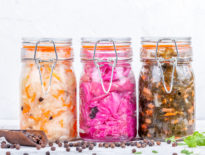
There is no doubt that what we consume plays a major role in maintaining a well-tended gut.
A similar analogy would be tending our garden. If we plant the seeds in composted, well amended soil that is abundant with soil bacteria, your garden will flourish. Your gut needs the same treatment consistently.
What we eat feeds the gut bacteria. If we feed it non-organic processed food, highly saturated fat, too much protein and sugar we can set up an environment where opportunistic bacteria overcrowd the good bacteria and bacterial overgrowth takes hold. This can happen in both the small(SIBO) and large intestines(LIBO). Diversity of food is just as important. A variety of plants, proteins, good fats and starches will nourish the gut bacteria and maintain a good balance. For example, eating soluble fiber rich foods, can feed certain gut bacteria that produce short chain fatty acids like butyrate. To list a few functions, it plays a role in reducing systemic inflammation, feeding colonocytes, upregulating brain derived neurotrophic factor(BDNF) and enhancing gut motility.
High fiber, both soluble and insoluble foods encourage daily bowel movements. Daily cleansing of our colon is essential to preventing overgrowth of undesirable bacteria. Also, fiber can help maintain healthy blood lipid levels(cholesterol) to prevent cardiovascular disease. It could also change the mix of SI and LI bacteria to prevent obesity. The abundance of certain bacteria has been correlated with an increase risk of obesity and insulin resistance.
Feeding gut bacteria with a healthy diet is responsible for biosynthesis of eight B vitamins: biotin, folate, cobalamin, niacin, pantothenate, riboflavin, pyridoxine and thiamin. Those vitamins are essential as cofactors in many biochemical pathways, namely, the energy (ATP)producing pathway called the Krebs cycle.
Ingesting a healthy array of colorful food is also key to gut health. The dark red polyphenols from fruits and vegetables are transformed by gut bacteria into anti-inflammatory fighters.
The colors of the rainbow should grace your plate daily in the variety of food you eat!
Gut bacteria are also responsible for producing neurotransmitters. These substances are built by ingesting amino acids. Certain gut bacteria convert the AA’s into serotonin, adrenaline, noradrenalin, dopamine and GABA. GABA is our only inhibitory neurotransmitter. It gives us a sense of calm to relieve tension felt in the body. Ninety percent of serotonin is made in the gut and is responsible for our happy mood. Research shows stress, anxiety and depression may be related to gut health and visa versa. The gut-brain/brain-gut connection plays a major role in our mental health!

